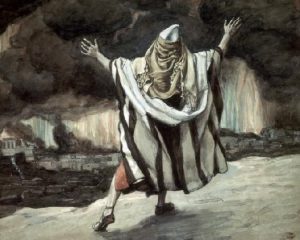by Lois Tverberg
Abraham came near and said, “Will You indeed sweep away the righteous with the wicked? Suppose there are fifty righteous within the city; will You indeed sweep it away and not spare the place for the sake of the fifty righteous who are in it? Far be it from You to do such a thing, to slay the righteous with the wicked, so that the righteous and the wicked are treated alike. Far be it from You! Shall not the Judge of all the earth deal justly? (Genesis 18: 23- 25)
 When we read the story of God and Abraham discussing the fate of Sodom, we are shocked at the fact that Abraham is so brash as to challenge God’s decision. He even dares to suggest that God needs to abide by the rules that he gave to men – that if we are to deal justly, so should he! How can he speak this way to God?
When we read the story of God and Abraham discussing the fate of Sodom, we are shocked at the fact that Abraham is so brash as to challenge God’s decision. He even dares to suggest that God needs to abide by the rules that he gave to men – that if we are to deal justly, so should he! How can he speak this way to God?
Interestingly, this story has several comments from Jewish understanding that show that they see Abraham’s actions in a very positive light. His boldness with God is a sign of his tremendous trust of God – Abraham is like a little boy who keeps pulling on his father’s coattails. Even though his father seems stern, the little boy knows that his dad is utterly kind and gentle at heart, and he can be a little bold in begging him for a treat.
Also, it is noted that for some mysterious reason, God wants us to plead on behalf of sinful people. He says in Ezekiel, “I searched for a man among them who would build up the wall and stand in the gap before me for the land, so that I would not destroy it; but I found no one.” (Ezek. 22:30) God does not want us to stand by passively and watch judgment come on others. He wants us to intercede, both telling them to repent, but begging God to be merciful.
In fact, the greatest heroes of the Jewish people are Abraham, who pleaded for the people of Sodom, and Moses who pleaded for the Israelites. When they had abandoned God’s covenant and were in danger of being destroyed, they begged God to relent from judgment. Two other figures, Noah and Jonah, heard of God’s judgment and didn’t bother to pray for mercy for others. Noah built his boat and saved his family, and Jonah even got mad when God had mercy! These two figures never were as highly regarded in Jewish thought.
Interestingly, we can see that Jesus fits into the first category of being truly heroic when he pleaded for mercy at his crucifixion, because “they did not know what they were doing.” And finally, by bearing our sins himself, he was the ultimate hero in gaining mercy for sinners.
Photocred: James Tissot


